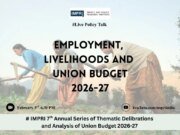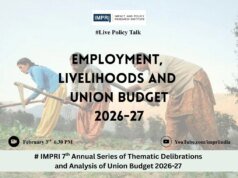Policy Update
Anamta Husain
Pradhan Mantri Dakshata Aur Kushalata Sampanna Hitgrahi (PM-DAKSH) Yojana is a Central Sector Scheme implemented by the Ministry of Social Justice and Empowerment (MoSJE), Government of India. Launched in 2020-21, the scheme is focused on the upliftment of socially, economically, and educationally marginalised sections of society.
The target groups under this scheme are Scheduled Castes (SC), Other Backwards Classes (OBC), Economically Weaker Sections (EWSs), De Notified Tribes (DNT), and Safai Mitras, including waste pickers. Most of the people belonging to these groups have limited economic assets. This makes it essential to provide skill training and strengthen their competencies as a critical step toward improving their economic well-being. Under the scheme, any OBC or EWS candidate with an annual income below ₹3 lakh is eligible, while there is no income limit for SC/OBC/DNT/Safai Mitras.
The initiative is designed to deliver high-quality skill training through reputed institutions to ensure that the trainees secure employment opportunities or go into self-employment ventures. The Recognition of Prior Learning component acknowledges and upgrades informal skills, aiming to boost employability without disrupting occupational continuity. Moreover, it also aims to support rural artisans who have slowly become marginalised due to the introduction of advanced technologies in the market. Such artisans would be trained in modern techniques to enhance their productivity and consequently boost their income generation.
The programme is being implemented by three Public Sector Undertakings (PSUs) operating under the Department of Social Justice and Empowerment. These include:
- The National Scheduled Castes Finance and Development Corporation (NSFDC),
- The National Backward Classes Finance and Development Corporation (NBCFDC), and
- The National Safai Karamcharis Finance and Development Corporation (NSKFDC).
Types of Training under PM-Daksh Yojana
- Upskilling/Reskilling under Recognition of Prior Learning: This will be applicable only to Safai Mitras, including waste pickers, who are at the bottom of the pyramid. The curriculum is designed to focus on safe and healthy sanitation practices and occupation-specific skills based on applicable and approved Qualification Packs (QPs). The training also includes certification as per the standard process.
- Short Term Courses: The focus of these courses is on increasing employability in high-demand sectors or self-employment opportunities. It targets the most marginalised groups, including people from SC, DNT, OBC, EWS, and sanitation workers. The training curriculum will adhere to the National Skill Qualification Framework (NSQF) and National Occupational Standards (NOS) issued by the Ministry of Skill Development and Entrepreneurship. It covers various job roles such as furniture making, self-employed tailoring, food processing, beautician workers, leather work, latex harvesting, etc.
- Entrepreneurial Development Programmes (EDP): The Ministry will engage institutions such as the National Institute for Entrepreneurship and Small Business Development (NIESBUD) and the Indian Institute of Entrepreneurship (IIE), both under the Ministry of Skill Development and Entrepreneurship, to conduct Entrepreneurial Development Programme (EDP) training. The groups will comprise SCs, EBCs, OBC and DNTs youth who have preferably done skill training under the PMKVY and incline towards an entrepreneurial mind.
- Long-term courses: These are courses especially designed for youth who have been educated up to class 10th and seek employment opportunities in high-demand sectors with adequate wages. The target groups are youth belonging to SC/DNT/OBC, EBC, etc., and the duration of the programme is 7 months.
Merits of the Programme: Provisions beyond Training
- Inclusion of Marginalised Group: The programme is specifically designed to target the most disempowered and marginalised sections of society. This ensures that opportunities and resources reach those groups who often do not have access to them.
- Recognition & Leveraging of Existing Skills: The component of the Recognition of Prior Learning takes into account and upgrades the existing informal skills of the trainees. This might lead to the enhancement of employability without disruption in the occupational experience of the people.
- Linkage to National Standards: The courses are designed to align with the National Skill Qualification Framework (NSQF) and National Occupational Standards (NOS) issued by the Ministry of Skill Development and Entrepreneurship. This ensures that the course experience will also have practical relevance while aligning with established standards.
- Improving Participation & Retention: The training for Upskilling/Reskilling includes a stipend of Rs 500/- for the trainees. The compensation is for the wage loss incurred during the duration of the programme. Moreover, the training is for 35 hours, designed to accommodate trainees’ existing work commitments, thereby minimizing disruption’. Both these factors provide strong incentives for trainees to participate, as they help offset the potential loss of income from their existing occupations.
- Diversity of Job Roles & Digital Literacy: The short-term courses have a diverse range of options available, such as carpet weaving, furniture making, self-employed tailoring, latex harvesting, beautician training, etc., which gives trainees a wide array to choose from based on their existing inclinations, if any. Courses are supplemented with modules on financial and digital literacy, equipping trainees with essential competencies for modern livelihoods’
- Residential Support: For residential programmes, boarding and accommodation costs are fully covered as per Common Cost Norms (CCN) for the entire duration of the training. This ensures that trainees from remote or low-income backgrounds can participate without facing an extra financial burden.
Way Forward: What can be improved?
PM-Daksh Yojana is a crucial step towards increasing the employability and creating pathways to self-employment for sections of society that lack access to resources and infrastructure due to economic marginalisation.
However, there can be some steps taken to make the programme more comprehensive. The current reliance on online digital platforms for registration can create accessibility challenges for those who come from low-income and under-exposed backgrounds with limited internet access and digital literacy. To address this gap, the programme could collaborate with community-based organisations working at the grassroots level. These organisations can act as critical intermediaries improving last-mile access to digital infrastructure and program awareness.
Additionally, their deep understanding of local contexts can help design training modules with relevant job opportunities and income-generating activities based on the region. Gender-responsive measures are essential to support women’s participation amid caregiving duties and mobility constraints. Women participants might also face mobility barriers, which can be improved upon through collaboration of local organisations who have a better understanding of the cultural and social dynamics of their regional context.
Moreover, the programme can be enhanced by introducing a post-training evaluation and support mechanism to gauge the outcome of the training, as well as providing follow-up support to the participants. The areas that can be potentially covered include job training and placement, credit access, and market exposure to participants opting for self-employment ventures, which can enhance the long-term impact of the training.
References
About the Contributor: Anamta Husain is a Research Intern at IMPRI, New Delhi. She is currently pursuing her Bachelor’s in Political Science from Ashoka University, Sonipat.
Acknowledgement: The author extends her sincere gratitude to the IMPRI team and Ms. Aasthaba Jadeja for her invaluable guidance throughout the process.
Disclaimer: All views expressed in the article belong solely to the author and not necessarily to the organisation.
Read more at IMPRI:
Modernization and Removal of Obsolescence (MODROBS), 2025
Digitizing Memory, Democratizing Access: Abhilekh Patal, 2015



















